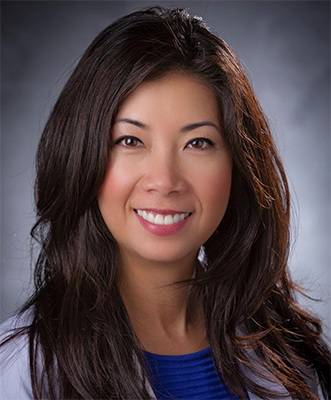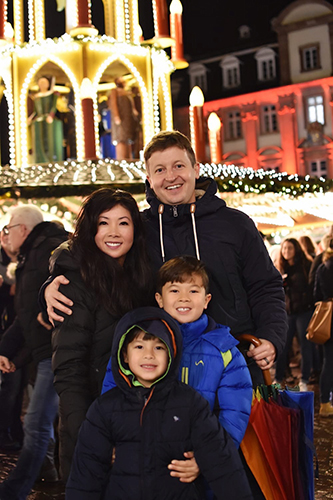
Dr. Chi Hornik is the Director of Clinical Research in the Division of Pediatric Critical Care Medicine. She received her Doctorate degree from the University of North Carolina at Chapel Hill where she maintains a faculty appointment. She is a clinician in neonatal and pediatric critical care, a pharmacotherapy specialist, and has faculty appointments in the Duke School of Medicine and the Duke Clinical Research Institute. Hornik talks about her diverse responsibilities as a clinician, researcher, and mentor, how COVID-19 has affected her work and personal life, and how she became interested in pediatrics and pediatric critical care and neonatal medicine in particular.
How long have you been at Duke? How did you decide to come here?
I began my advanced training and practice in clinical pharmacology within neonatal and pediatric critical care medicine in 2006. I came here, because I was driven by the opportunities to learn from the complexity of patients and extraordinary faculty across the Department of Pediatrics.
What were your pre-COVID responsibilities at Duke? What did a typical day for look like?
As Dr. Mara Becker nicknamed me, I am a “misfit.” My responsibilities include clinical service in the NICU and a combination of clinical research (leading multicenter clinical trials through DCRI, site PI of clinical trials at Duke, Director of the Pediatric Critical Care Research) and administrative activities (Chair of the Medication Safety Alliance, Team Lead of Maestro Care builds, coauthor of >70 clinical guidelines in the NICU). I also provide monthly resident lectures and mentor trainees.
A typical day would be rounding for several hours, writing a dozen TPNs and PK assessment notes, responding to any emergencies, and answering questions from faculty, trainees, and staff. I would also be multitasking on conference calls and answering questions from the teams at DCRI and sites involved in the clinical trials. In between, I would try to screen or consent patients and conduct other study procedures for site-based research. Emails and questions from the unit and from research teams would often continue through the evening.
How has the COVID-19 pandemic affected your work? What’s one strategy you and your colleagues have used to adapt or compensate?
COVID-19 has affected everyone in such profound ways. In general, every team I am a part of has been exponentially busier. In the unit, Dr. David Tanaka and I were able to set up secure virtual rounding in mid-March 2020. At DCRI, pivoting to a COVID-19 study that is evaluating standard of care therapeutics, even through an existing clinical trial framework, required intense collaboration, with sites across the US and Canada, as well as coordination during a very challenging and condensed period of time. In PCCM, my hardworking study coordinators were able to continue to do a lot of work from home, but this shifted more work for me while I was on-service in order to continue enrollment in studies that were permitted to continue.
Our amazing team members share the same passion of helping to improve the health of all children, and that has been our fuel during this time to press forward through challenges. I am humbled everyday by their compassion, drive for improvement, and empathy during these times.
How and when did you initially become interested in pediatrics and pediatric critical care and neonatal medicine in particular?
My interest in medicine and clinical pharmacology started early during my childhood when my mother had repeat admissions to the ICU due to complications incurred following my family’s journey to America as Vietnam War refugees in the 1980s. Her polypharmacy often led to iatrogenic harm. Through her hardships, I was inspired to learn more in order to advocate for her and to help other patients like her. My interest shifted to pediatrics when I discovered how understudied children and particularly pharmacotherapies in children are. I wanted to pursue an area where I may have a larger impact on the care of the most vulnerable patients, the critically ill infants and children, in order to protect them from iatrogenic harm while optimizing their management.
Is there any research you are doing or plan on doing? What is involved with your role as Director of Clinical Research in the Division of Pediatric Critical Care Medicine?
Through the NICHD-funded Pediatric Trials Network (PI: Dr. Danny Benjamin), I work with incredible faculty and staff at the DCRI and help lead multicenter trials in children: I am PI of a safety, pharmacokinetics, and pharmacodynamics study evaluating understudied drugs, Co-PI of an upcoming infant platform trial, and Co-I for a bronchopulmonary dysplasia prevention trial. At the hospital, I am the site PI of 7 concurrent federal and industry-funded clinical trials involving a wide range of therapeutics, from anti-infectives to anesthetics. I am fortunate to have the perspective of being a part of the protocol teams designing clinical trials at the DCRI as well as the site team at Duke that conducts trials. This insight has helped me to appreciate the intricate thought processes and tremendous efforts required to implement studies successfully.
These collaborative experiences have been instrumental in my role as Director of Pediatric Critical Care Clinical Research. I am truly honored to work closely with many members of the Department, including study coordinators, faculty, trainees, clinical staff, grants managers, CCRU leadership, and regulatory administrators to facilitate study activities, delegate effort, maintain budget, and develop operational strategies, including our ongoing efforts to maintain our strong minority recruitment in these clinical trials. Through our inclusive and extraordinary collaboration across 15 active clinical trials in the past 3 years, we have enrolled >400 children.
What do you enjoy most about your work?
I am not sure I have one answer. I truly enjoy being a part of a multidisciplinary team and being able to directly impact patient care; being at the bedside in order to apply evidence-based practices and to help identify knowledge gaps; consenting families for research and hearing them altruistically share that they stand by our mission to improve the health of other children just like theirs; and being able to learn from giants in research in order to help future patients.

How has the epidemic affected your life outside of Duke? What’s one positive strategy or resource you’ve found that helps you cope?
Unfortunately, our plans to visit family in Germany will not happen this year. With schools and many camps closed, my husband and I have had to “hand-off” our 2 kids in the traffic-circle of Duke North between several shifts. Over time, with the help of iPads, there has been less eye-rolling. We are lucky that our kids are fairly independent and inquisitive, because we have pretty much failed at homeschooling our kids. Our first sign of failure was at the end of week one when a 2nd grade teacher notified us that the uploaded “completed” assignments were blank.
Our kids help us maintain our sanity and are the most positive aspects of our lives. They love telling jokes and enjoy making fun of my jokes whenever they can. At dinner, we take turns sharing what we learn and did each day to help everyone decompress. We also try to keep up with the Bundesliga and Premier Leagues (European soccer) that have been open for a couple of months. This provides everyone a glimpse of normalcy.
What passions or hobbies do you have outside of Duke?
I love to spend time with my husband, Christoph, and boys, Carl and Colin, whether it is playing HORSE (basketball) in the drive-way, board games, or watching a movie. Pre-COVID times, I enjoyed watching our sons’ soccer games, playing tennis, sketching, volunteering, and going on road trips.